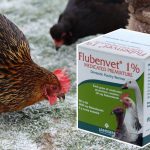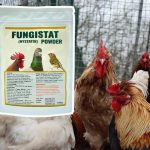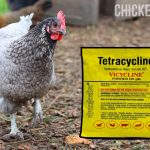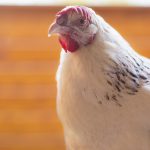Newcastle Disease in Chickens
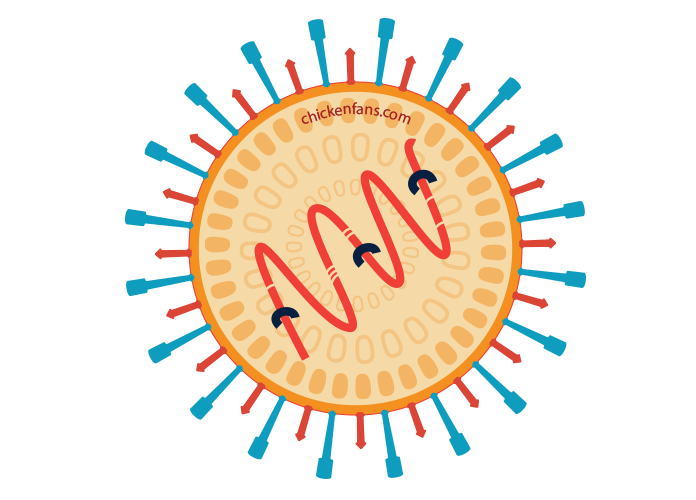

Newcastle disease in chickens is one of the top 5 causes of death in the poultry industry worldwide. In the USA, Canada, and Western Europe, the virus is phased out, but there are still outbreaks once in a while. In other countries, the virus is still very active and is depopulating multiple flocks, despite a variety of vaccines available on the market. Unfortunately, there is no treatment.
Should you be worried? What can you do? Let’s find out.
- What is Newcastle Disease?
- Symptoms of Newcastle Disease
- The severity of Newcastle Disease
- Transmission
- Treatment
- Vaccination
- Prevention
- Occurrence
- Is Newcastle Disease contagious to Humans?
- How is Newcastle Disease Virus relevant for Human Cancer Treatment?
- History
- Summary
What is Newcastle Disease?
Newcastle disease is a widespread, highly contagious disease caused by the avian paramyxovirus (APMV), also known as Newcastle disease virus (NDV). It targets chickens and many other birds.
There are various strains of the virus circulating. Some incur mild symptoms, whereas virulent strains can wipe out entire unvaccinated flocks. In acute cases, birds can die very rapidly.
It’s a worldwide virus that’s ever-present at a baseline level and pops up now and then. It’s a notifiable disease, so there is a duty to report Newcastle disease outbreaks.
The virulent strains of the virus are not currently present in the US. However, flocks are tested for Newcastle disease and avian influenza whenever a large number of birds perish in a single day. Previous outbreaks have led to the slaughtering of thousands of chickens and export bans.
The Newcastle disease virus can also infect humans, causing mild fevers, eye irritation, and a general feeling of illness.
Symptoms of Newcastle Disease
The symptoms vary a lot depending on the virus strain causing the disease. One or more of the following body systems are attacked:
- the nervous system
- the respiratory system
- the digestive system
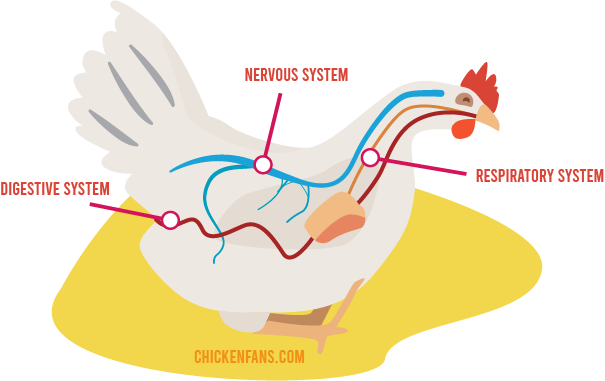
Most infected chickens will show respiratory problems such as:
- gasping
- coughing
- sneezing
Newcastle disease is well-known for the effects it has when it attacks the nerves in the chicken’s body:
- tremor, spasms, and shaking movements in one or more parts of the chicken’s body
- difficulty walking, stumbling, and falling on the ground
- paralysis of wings and legs or complete paralysis
- twisted neck and strange head positions
Since the digestive system is put under pressure, you can also notice:
- green, watery diarrhea
- blood in the diarrhea
Many chickens will only show mild signs of general illness and exhaustion, especially for mild virus strains or when the birds are vaccinated.
In laying hens, there is a sudden egg drop, and it’s possible to see shell-less eggs.
Generally, it takes about 6 days to see some signs of infection, but it can take up to two or three weeks in some cases. In severe cases, the virus may result in sudden death without the sign of any clinical symptoms. Vaccinated birds can be asymptomatic but can still pass on the virus to other chickens.
The severity of Newcastle Disease
There are many Newcastle disease virus strains, and each causes infections with a different severity.
For easier understanding, they were classified into three groups:
- virulent (velogenic)
- moderately virulent (mesogenic)
- low virulence (lentogenic)
The original classification is helpful, but there was still confusion regarding the different strains.
To make things simpler, today, the velogenic and mesogenic disease forms are called virulent Newcastle disease (vND) or just Newcastle disease. Because the virulent strains are not endemic in the United States, it’s also called exotic Newcastle disease.
The lentogenic strains of the virus are very widespread but cause few health issues and are used to make vaccines.
The most severe form of infection is caused by a strain called viscerotropic velogenic Newcastle disease (vvND).
In most countries globally, infections with the virulent Newcastle disease virus need to be reported to the World Organisation for Animal Health (WOAH).
Transmission of Newcastle Disease
In some countries in the world, like the USA, Canada, and most West European countries, the virulent strains of the Newcastle disease virus are controlled. But still, they pop up from time to time due to infections passed on by pigeons and cormorants. Imported parrots also carry the virus frequently and are a source of infection for chickens.
The virus spreads from city to city, village to village, and island to island, completely destroying the chicken populations.
When the virus has entered the flock, the other chickens become infected after a couple of days. Virulent strains spread in many ways to infect other chickens in the coop and are passed by:
- the chicken’s breath and exhaled aerosols in the air
- sneezing and coughing
- droppings
- egg-laying
- carcasses of dead birds
The virus spreads a bit slower for strains that are only passed on via the chicken’s droppings. In those cases, it can take up to two weeks before the full flock is infected. Young birds are especially sensitive to the disease.
Survival of the virus outside the chicken
The virus can survive multiple weeks in the chicken coop and run and is resistant when embedded in the dirt. However, it will break down in direct sunlight due to UV radiation.
Virus transmission via eggs
There is still some debate about whether the virus can be passed through eggs. There are some reports from scientists and convincing observations in the field to believe so. However, it’s still possible that baby chicks are only infected through their environment or via dirty eggshells.
To be safe, the Terrestrial Code of the OIE prescribes a quarantine period of at least 21 days for the export of chicks hatched in Newcastle disease-free countries.
Treatment for Newcastle Disease
Unfortunately, there is no treatment for Newcastle disease yet. Antibiotics can’t help because it’s a viral disease. However, sometimes antibiotics are prescribed to prevent any secondary infections that can occur when the birds are weak.
Some research reports that there are multiple benefits of adding vitamin supplementation to chicken food:
- vitamin A: boosts the immune system against Newcastle Disease; one study reports a reduced mortality rate with a 36% drop
- vitamin E and C: in 2021, multiple studies found positive results with adding vitamin e and c supplements to the infected chicken’s diet. The health benefits result from vitamins e and c working as antioxidants. Injecting vitamin e or c directly into the egg improves chicken embryos’ hatchability.
It is also possible to vaccinate for Newcastle disease.
Vaccination for Newcastle Disease
Vaccines have been available since 1930, four years after the initial outbreaks of Newcastle disease in Indonesia and Newcastle.
The first vaccines were based on a weakened version of the virulent Newcastle disease virus. At the end of the 20th century, vaccines rapidly progressed with new techniques available. There is currently a variety of vaccines on the market:
- conventional live virus vaccines – based on the low and mild severe strains, can be added as supplements to the drinking water
- inactivated vaccines – inactivated using formaldehyde, needs to be injected into the birds and are more expensive
- recombinant vaccines – based on DNA encoding of antigens and combines vaccination for other diseases such as the fowlpox virus
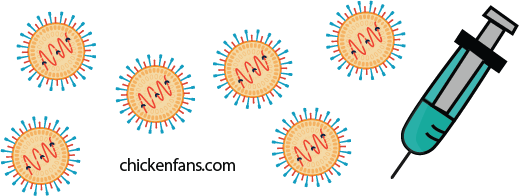
Although the vaccines are effective, they can’t seem to control the worldwide spread of the disease. Several countries report multiple outbreaks per year. The problem is that every vaccine has certain limitations:
- some vaccines need to be stored in refrigerators, highly cooled, so they are difficult to apply
- some vaccines can’t overcome the passive immunity in day-old chicks
- some vaccines must be injected into the egg, which is not practical for backyard chicken owners
- some vaccines need multiple injections
To overcome these issues, vaccination is frequently rolled-out in a vaccination program that encompasses multiple interventions at different ages and with several vaccines. Programs are designed based on local environmental circumstances.
Newcastle Disease Virus as a Vaccine Vector
The Newcastle disease virus is actively used as a carrier to create new vaccines for other viral diseases in humans. In 2022, it’s being researched in the fight against COVID-19 for vaccination against SARS-CoV-2 variants, such as Delta, Beta, and Omicron. Newcastle disease virus is also used as a vector for Ebola vaccines.
The advantage of using the Newcastle disease virus is that it can be manufactured at a large scale and low cost using embryonated chicken eggs.
Prevention of Newcastle Disease
Despite 100 years of fighting the Newcastle disease, it’s still around, and preventing outbreaks has proven very difficult. Especially in Asia, Newcastle disease continuously threatens the poultry industry. That’s why vaccination programs are essential in preventing Newcastle disease.
Vaccination efficacy
In countries that almost ruled out frequent outbreaks, like the USA and Western Europe, vaccination is based on the mild types of the virus strains. In high-risk areas around the world, more aggressive vaccines are common practice.
However, even in well-organized, highly secured poultry farms in the USA, lab tests frequently show that birds still carry viral antigens. So even with extraordinary biosecurity measures, the disease is still spreading through wild bird populations, backyard poultry, and small-scale homesteading.
Measures for backyard poultry
Since vaccination can not guarantee the complete elimination of the disease, it’s essential to practice good biosecurity.
When managing a backyard flock in high-risk areas for Newcastle disease, there are some measures you can take:
- Separate new birds – isolate new chickens that you are introducing to a flock, especially when they are coming from different sources
- Avoid contact with other chickens – try to avoid places where you come in contact with potentially infected birds, like local markets
- Keep wild birds and rodents out – try to cover the run and establish a safe perimeter around the coop. Prevent wild birds from entering the chicken run and feeding on the chicken’s feed. Same for mice and rats.
- Keep the environment clean – always clean the tools you use and the clothes and shoes you wear, and properly dispose of manure
Even if you live in lower-risk areas, you should be alerted when you hear news about outbreaks.
Occurrence of Newcastle Disease
Although vaccination did not rule out the Newcastle disease worldwide, some countries almost completely phased out the disease. However, it’s not entirely eradicated, and the virus pops up now and then. Worldwide, Newcastle disease is one of the most common diseases that target backyard chickens and small village flocks.
Countries where Newcastle disease is of low-risk include:
- USA
- Canada
- Brazil
- Western Europe
Australia is free from severe strains but has seen some outbreaks in commercial flocks. The disease is a problem in Indonesia and Timor-Leste, close to Australia.
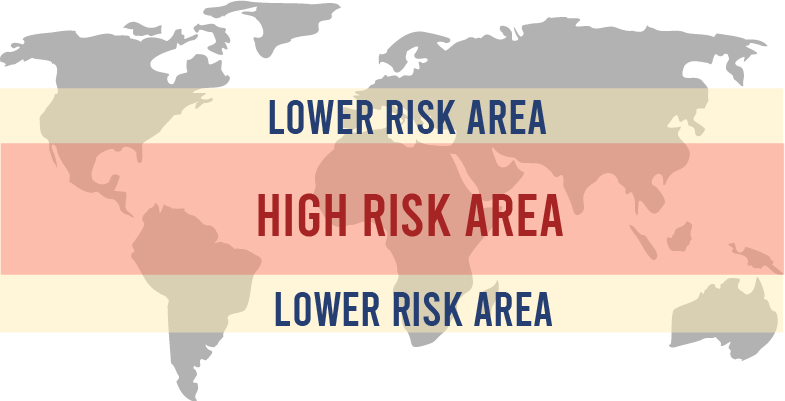
Many countries still struggle with the disease and frequently suffer from plagues. The virus is an omnipresent threat to poultry and backyard chicken owners.
Locations where the virus is still prevalent include:
- Africa
- Asia
- Latin America
- Eastern Europe
- Middle East
In these countries, getting your chickens vaccinated against Newcastle disease is essential. The virus is re-emerging in countries such as Mexico, Colombia, Venezuela, and Peru.
Newcastle Disease in the United States
The virulent strains are not present in the United States at this moment, and the likelihood of a backyard flock dying from the virus is relatively low.
However, California had recent viscerotropic velogenic Newcastle disease outbreaks in 2002 and 2003 and virulent outbreaks in 2018. The virus affected 46 premises in Los Angeles, 263 premises in Riverside, and 164 in San Bernandino. The virus then mainly affected small backyard chicken flocks and household flocks in large cities.
The USDA-APHIS, responsible for keeping the virus out, announced in 2020 that the virulent versions of the Newcastle disease virus are eradicated from the US.
Because the virus is not endemic in the United States, it’s also known as exotic Newcastle disease.
Is Newcastle Disease contagious to Humans?
Yes, the virus causing Newcastle disease can infect humans. The infection is much less severe than in birds and only causes mild flu-like symptoms, eye infections, and throat infections. However, these symptoms are rare, and most human infections are asymptomatic. Rearing and eating chicken are not risk factors.
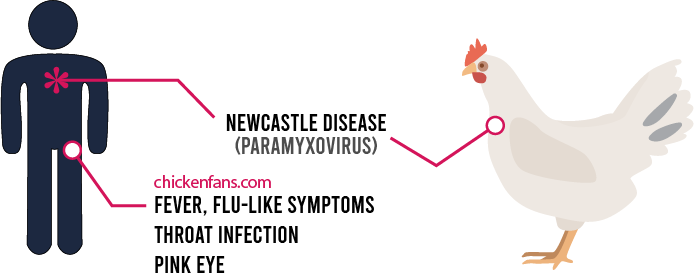
Infections are most likely to occur in people exposed to large quantities of the virus, such as laboratory workers, vaccination team members, and employees in processing plants.
A human eye infection is nothing more than pink eye, an inflammation of the transparent membrane that lines your eyelid and eyeball. It’s very rare to catch it from the Newcastle disease virus, and the condition is entirely benign.
The fact that this virus is rather innocent in humans has made it an excellent host for cancer treatment.
How is Newcastle Disease Virus relevant for Human Cancer Treatment?
Although it can be fatal for chickens, the Newcastle disease virus causes only mild symptoms in humans. It’s researched for cancer treatment because the virus can replicate faster than cancer and prefers killing cancerous cells.
Apart from killing cancer cells, the virus also boosts the immune system. When the Newcastle disease virus is injected directly into the tumor, it starts killing cancer cells, and at the same time, it replicates faster than the tumor can. Clinical trials demonstrate good responses against multiple cancers.
In 2020, Bhurman B., an oncologist at the New York Cancer Center, described the role of the Newcastle disease virus as a frontrunner in immunotherapy. With modern techniques for genetic engineering, new methods emerge to modify the virus to enhance its immunogenic potential. More research is currently being conducted to understand how the virus affects the immune system and can be used to target a variety of cancers in humans.
History of Newcastle Disease
The first outbreak of Newcastle disease was in 1926 in Java, an island in the center of Indonesia. However, the disease is named after its outbreak in 1927 in Newcastle-upon-Tyne in England. The virus was probably already affecting chickens multiple years before these outbreaks, as they got infected by wild birds.
In 1964, researchers started investigating Newcastle disease Virus as a cancer agent.
For decades, the virus has been one of the biggest causes of worldwide losses in the poultry industry. Up until today, it’s in the top 5, together with avian influenza and avian bronchitis, despite the availability of multiple vaccines and vaccination strategies.
Summary
Newcastle disease is a contagious disease that is still a worldwide threat to the poultry industry and backyard chickens. Vaccination has phased out the disease in many countries, but the virus is still omnipresent despite all vaccination campaigns. There is no perfect vaccine yet, and most vaccines must overcome some complexities. New vaccine development is showing promising results in terms of efficiency, ease of management, and application.
There is no antiviral treatment yet, but vitamin supplementation boosts the immune system of chickens to fight Newcastle disease. Apart from vaccination, practicing good biosecurity is key to preventing the disease.
Being fatal for chickens, the Newcastle disease virus can also affect humans but only comes with mild symptoms. It’s actively researched as a cancer medicine as it has the remarkable ability to attack cancerous cells and replicate faster than cancer.

Dr. I. Crnec is a licensed veterinarian with several years of experience. She has published work on the effect of vitamin supplementation, egg-laying performances of chickens under heat-stress conditions and the effects of calcium supplementation on eggshell strength.
